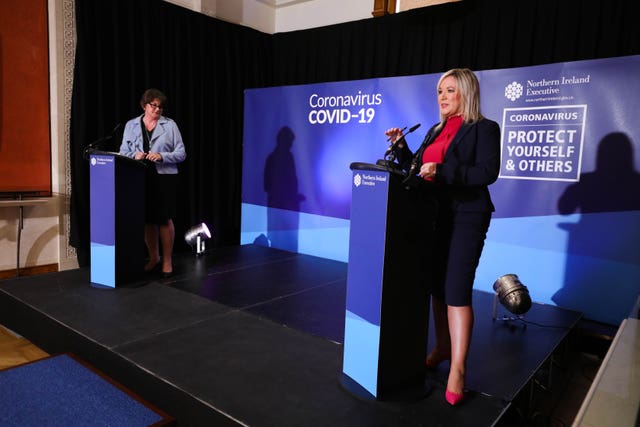Stormont executive fails to agree position on Brexit extension
SDLP minister Nichola Mallon has urged colleagues to call on the UK Government to ask the EU for the transition period to be extended.

A call to extend the Brexit transition period to give businesses more time to deal with coronavirus has divided the Stormont executive.
SDLP Infrastructure Minister Nichola Mallon has proposed that executive colleagues jointly urge the UK Government to ask the EU for an extension beyond the end of 2020.
While her call was backed by ministers from Sinn Fein and the Alliance Party, the DUP and UUP opposed the move, resulting in a tied vote.
Even if Ms Mallon had secured a majority around the executive table at Monday’s meeting, the proposal would still have fallen if the DUP had voted against it, under cross community voting rules.
During the meeting of the devolved administration, ministers agreed to revisit the issue in two weeks’ time.
Ms Mallon said businesses and communities were “consumed” by the impact of coronavirus.
“In recognising this I brought a proposal to the executive today that as a Northern Ireland Executive we would write to the UK Government requesting an extension to the transition period, just as they have done in Scotland, just as they have done in Wales,” she said.
“It was disappointing that the DUP didn’t vote in support of my proposal.”
She added: “I think it’s very important at this time that we do all we can to protect our businesses and our communities and that is why we must request an extension of the British Government.”
The EU has stated a willingness to consider a two-year extension of the transition arrangements to provide time to reach a comprehensive trade agreement.
But the UK Government has insisted the transition period will end as scheduled at the end of the year.
When the transition period ends the Northern Ireland protocol will come into force – an arrangement by which the region continues to follow single market rules for goods and administers the EU’s customs code at its ports.

Mrs Foster, who said the executive’s private deliberations should not have been made public, stressed that an extension was a matter for the UK Government.
“It’s not a matter for the executive here in Stormont,” she added.
“I believe something we need to focus on doing is making sure that we have the minimum amount of risk to the Northern Ireland economy, that’s certainly where my focus is at currently in terms of the Northern Ireland protocol, and I hope it’s where the focus of my colleagues is at as well.
“I would much prefer to move forward in terms of consensus, building consensus. I think we have consensus around the fact that we all want to protect the economy of Northern Ireland after Brexit and after the transition period, and therefore we should focus on that and make sure that we do our best for the economy and the people of Northern Ireland.”
Mrs O’Neill said an extension was necessary because the local economy was “on its knees”.
“Given the Covid-19 pandemic and the economic impact that’s having on our economy, I think it’s only reasonable the deadline should be extended,” she said.
“There’s a need for an extension in order to allow us to be able to deal with the economic catastrophe that is Covid-19 and its implications for our economy.
“There isn’t anything good to come from Brexit, there should be an extension and if this is going to be foisted upon us then my opinion is that there should be an extension.
“Our local economy is on its knees because of the coronavirus epidemic and the fact that they’re having to respond and deal with all of that and to have that shock, and then to have the Brexit shock, the outcome of which remains to be seen, so there should be an extension.”





